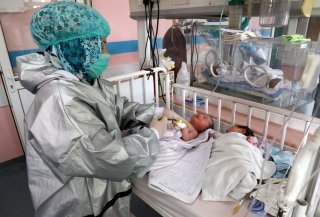The Effect of Coronavirus on the Afghan Economy
Could COVID-19 make decades of carnage even worse?
3. Increase Investment in the Health Sector. Afghanistan's public health sector is weak in general, which makes its population vulnerable to the rapid spread of the coronavirus. Currently, there are only two coronavirus testing labs with a total capacity of nearly 2,000 tests per day. There are four in Kabul (National Public Health Lab, National Veterinary Lab, Afghan-Japan Hospital, and Military Hospital), and one each in Herat, Kandahar, Nangarhar, Balkh, Paktya, and Kunduz. A new one-hundred-bed coronavirus hospital is now open in Herat. The Afghan-Japan hospital initially could not conduct even a hundred tests per day when it started operations. Now it can do at least six hundred tests per day, which is still not sufficient given the alarming number of people at risk.
Additionally, health workers are more prone to the virus. According to Public Health officials, more than 350 medical staff have been infected with the virus. This may put serious pressure on the health system, which will ultimately cause adverse economic effects in the country. In the absence of the necessary health facilities and adequate health workers, the increasing number of deaths will cause more damage to the workforce, and companies and small and large entrepreneurs will be harmed.
4. Quarantine Affected Cities and Create a Safety Net. The government should create a stronger safety net with the cooperation of international organizations and distribute food and other basic necessities to the people. And if it is in the power of the government, it should help the people with the distribution of cash via assistance programs. Although this may seem impractical, it will help the government save the country. How much is a human life worth? To prevent the rapid spread of the coronavirus, the government should have mandated compulsory quarantine in areas most exposed to the coronavirus much earlier. Still, people are very indifferent to lockdowns. Only recently, hundreds of people were out in the city doing their Eid shopping despite the fact that the government extended lockdown measures until May 25 across the country.
5. Support the Private Sector. Since small and large domestic businesses will be affected by the pandemic, the government should assist them with tax exemptions or subsidies. As the coronavirus spreads, private investors are likely to leave the country, which would be a major blow to the economic cycle. In order to ensure that there is no disruption in the food supply chain and other basic necessities of the citizens, the customs tariffs, especially the tariffs imposed on foodstuffs or raw foodstuffs, should be reduced or be put at zero.
6. Handle Financial Markets Disruption. The Central Bank of Afghanistan, as it is sensitive to the risks of banks in developed countries, must be prepared to respond to the turmoil in the financial markets. To restore financial stability and boost growth, it may need to reduce interest rates and inject liquidity. It is worth mentioning that with the global infection of coronavirus, the issue of transmission of this virus through coins and paper money has also been considered. Afghanistan is a country where cash is still a common mode of financial transactions. The WHO announced on its website that it has not yet conducted a specific study on the rate at which viruses can be transmitted through banknotes and coins, but in general coronavirus can survive for several days on various types of surfaces. The organization strongly recommends that people use electronic money transfer tools as much as possible and wash their hands thoroughly if they come in contact with banknotes and coins. Therefore, the Afghan government should make sure to inform people that they should wash their hands, including after handling money—especially if they are eating or touching food. The government may also explore ways to collect old money from the market.
7. Observe Strict Transparency in International Aid. The international community has so far pledged over $600 million to Afghanistan to help the country in its fight against coronavirus. Of that amount, $100 million was provided by the World Bank, 117 million euros were pledged by the EU, $50 million was pledged by the Asian Development Bank, $35 million was promised by the United States, and $220 million in loans were granted by the International Monetary Fund. Other countries such as China, the United Arab Emirates, Iran, and the Czech Republic also provided material aid—in many cases in the form of medical equipment. The government needs to undertake transparent management and spending of the aid money.
Afghanistan’s Future
Now that Abdullah Abdullah and Ashraf Ghani have signed a power-sharing deal, they should pay serious attention to addressing the coronavirus crisis in the country besides prompting entry into intra-Afghan negotiations with the Taliban, who are hampering and harming the coronavirus efforts across the country. The United States on the other hand should also act more fairly in helping Afghanistan at this difficult time of the crisis. A serious effort by the Afghan government, the United States, and the Taliban will not only help Afghanistan to avoid a major human catastrophe, but also salvage its nascent economy from the coronavirus pandemic storm.
Hanif Sufizada is a former Director of Private Sector Development at the Ministry of Agriculture, Irrigation and Livestock in Afghanistan. Currently, he manages higher educational programs at the Center for Afghanistan Studies at University of Nebraska at Omaha.

